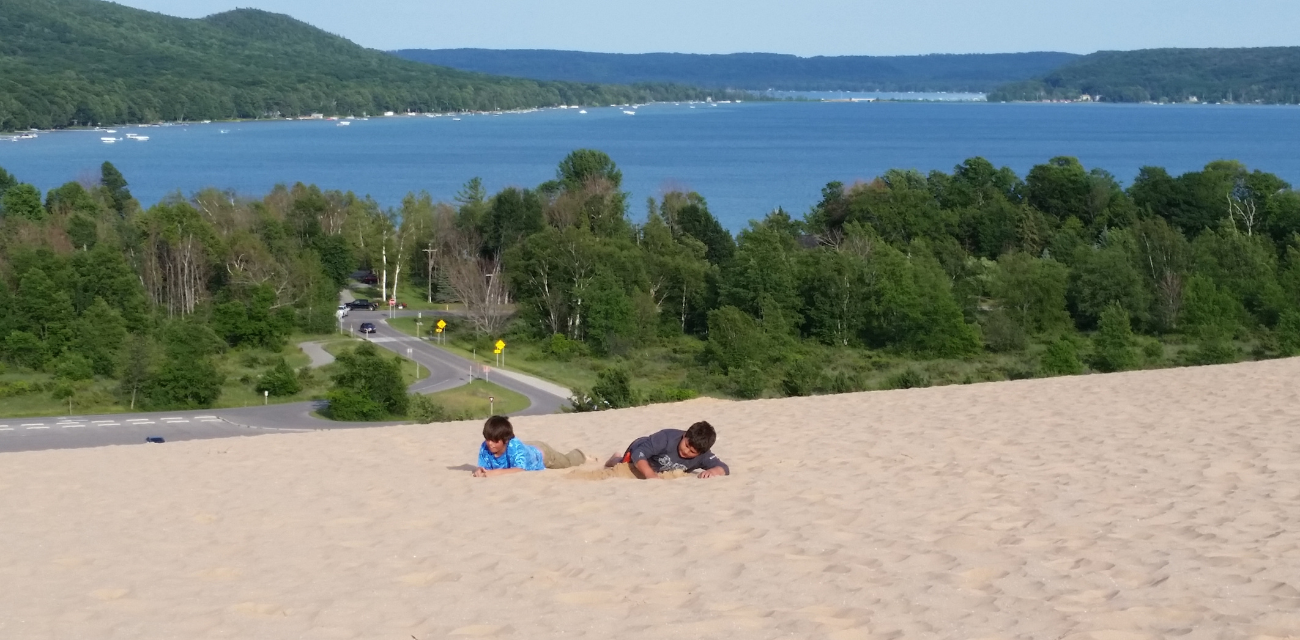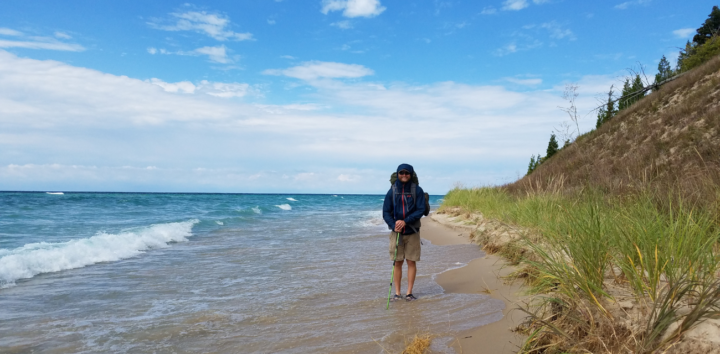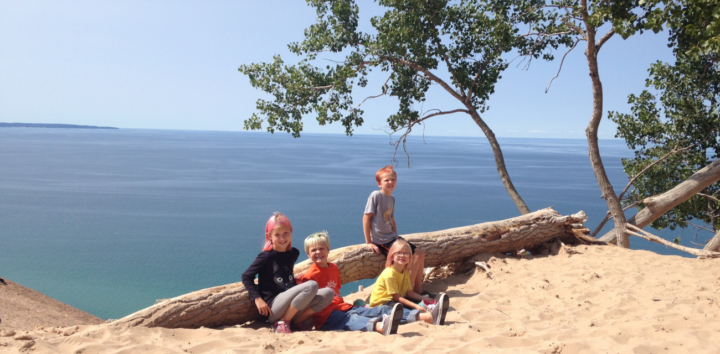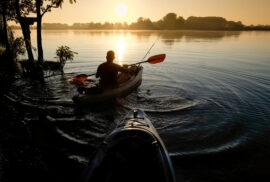First #HowYouDune summit celebrates Michigan’s coastal treasures

More than 60 scientists, natural resource professionals, outdoor recreation enthusiasts and others gathered in Muskegon on May 7 and 8 for the Freshwater Dune Summit, organized by Michigan Environmental Council and our partners at Heart of the Lakes and West Michigan Environmental Action Council.
The first-time event was made possible with funding from the Michigan Coastal Zone Management Program, Office of the Great Lakes, Department of Environmental Quality, and the National Oceanic and Atmospheric Administration.
The planning committee took a creative approach to the summit by building in opportunities to meet local outdoor recreation leaders and get out and learn about the local community assets alongside local partners, such as the Run Muskegon running club, and Guy’s Ultimate Kayak Service. Guests arriving Sunday took their pick between running or biking in the dunes or kayaking down the Muskegon River, followed by a showing of outdoor films with a side of local pizza and beer. Monday’s participants had the option to take a morning field trip to the dunes in PJ Hoffmaster State Park and return for afternoon sessions, or to participate in morning sessions.

#howyoudune survey live this summer
The centerpiece of the event was the announcement of a new survey of dune users that launched May 29. Michigan State University professors Sarah Nicholls and Robert Richardson introduced the survey during a lunchtime keynote address. The online tool asks participants to identify where they recreate in Michigan’s coastal dunes, what activities they do there and how much they spend, along with questions about the noneconomic values of dunes.
A morning presentation from Lori Booth, global grants manager for the Surfrider Foundation, helped to put the survey in perspective. The Michigan dune survey is modeled on a Surfrider project that began in 2010, when plans were announced for wind and wave energy projects off the Oregon coast. Nobody really knew how those plans would impact recreational use of the coast by surfers and others, so Surfrider and partners launched a survey to learn where recreation was happening, what forms it was taking and how it impacted the economy in coastal regions.
“We knew that if we couldn’t put a dollar value on those uses, it would be, ‘OK, you can go sit at the little kids’ table'” as energy development plans went forward, she said.
When the State of Oregon finalized its plan for what coastal areas were right for energy development, it didn’t include any significant conflicts with prime recreation areas identified by the survey. It’s hard to say how directly the survey influenced that outcome, but Booth said Surfrider considered their project a success.

Learning what our coastal dunes mean to visitors
Similarly, nobody knows much about how Michiganders and out-of-state visitors use our coastal dunes. The summit and the new survey are early steps toward better understanding the value of our dunes and building a strong constituency of people who appreciate them so we can work together to protect these globally rare assets.
The summit also suggested that, armed with a better understanding of how people use and value the dunes, Michigan can better tap into their potential for attracting talent and building durable local economies. Candy Fletcher Kozeluh, recreation director for the Marquette County Convention and Visitors Bureau, opened Monday’s Dune Summit sessions by sharing how outstanding trails, Lake Superior access and wild places are drawing a surge of talent to the Upper Peninsula’s biggest city.
“I remember growing up in Marquette, we had such a hard time attracting doctors” because of the region’s remoteness and cold climate, she said. But marketing the area’s natural assets has made Marquette a magnet for people who consider outdoor recreation part of a high quality of life. “Outdoor recreation is what’s attracting them,” Kozeluh said. “We have people moving there from all over the place.”
The summit also included more in-depth presentations on the science of our coastal dunes and the species specially adapted to live there. Hope College professors Ed Hansen and Suzanne DeVries-Zimmerman gave an overview of the history of dune science, including the recognition that Depression-era attempts to stabilize Michigan dunes with tree plantings hampered the natural dune migration that underpins these unique coastal ecosystems.
Stabilizing dunes degrades them as habitat for several rare plants–including pitcher’s thistle, a threatened species found only in coastal dunes along Lakes Huron, Michigan and Superior–that need to be partially buried by shifting sand in order to reproduce. “These dunes are supposed to be moving and dynamic and changing,” said Shaun Howard of The Nature Conservancy and the Michigan Dune Alliance in his presentation on efforts to control invasive plants in the dunes. And David Foote, director of stewardship for the Grand Traverse Regional Land Conservancy, discussed how his organization is using controlled “trampling”–that is, people walking on the dunes–to promote natural dune migration.
Other speakers addressed challenges and trends in managing national lakeshores and other federal lands in the dunes, highlighted a project to increase coastal resiliency in northwest Michigan and discussed ongoing efforts to clean up Great Lakes beaches and restore and improve access to Muskegon’s waterfront.
“This was such a fun and inspiring event,” said Brad Garmon, the Environmental Council’s director of conservation and emerging issues and the event’s lead coordinator. “And it’s really just the kick-off of the real work we’re going be engaging in this summer–through the survey, stakeholder meetings, and direct outreach to communities and recreational groups up and down the coast–as we better connect and engage with people who love, value and enjoy these amazing Great Lakes assets.”
Discover
Power environmental change today.
Your gift to the Michigan Environmental Council is a powerful investment in the air we breathe, our water and the places we love.
Sign up for environmental news & stories.
"*" indicates required fields




